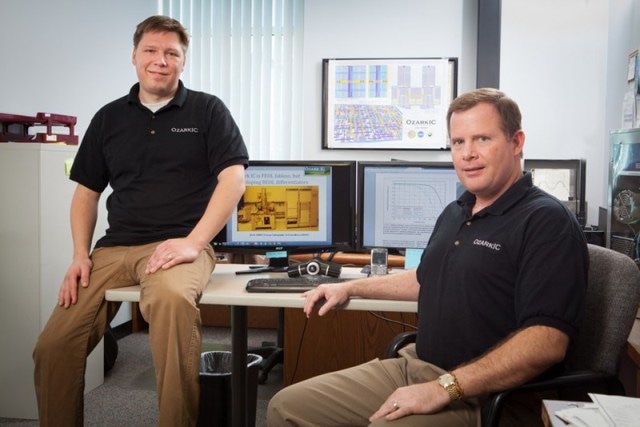May 17 2016
NASA has awarded $754,000 to a University of Arkansas-affiliated technology firm to build a silicon-carbide-based ultraviolet imager prototype for planetary exploration and Earth observation from space, among other applications.
 Matt Francis (left) and Jim Holmes of Ozark Integrated Circuits. (Photo by Russell Cothren)
Matt Francis (left) and Jim Holmes of Ozark Integrated Circuits. (Photo by Russell Cothren)
Ozark Integrated Circuits Inc., which designs semiconductors at the Arkansas Research and Technology Park, will develop a complex photo-detecting microchip that can operate in temperatures ranging from minus 200 degrees to 500 degrees Celsius (minus 330 degrees to 930 degrees Fahrenheit.)
“The uniqueness of our approach is the extreme responsiveness of our imager’s sensor and our ability to integrate it with the readout electronics to turn the detector readings into images for a computer or spacecraft system,” said Matt Francis, Ozark IC’s president and chief executive officer. “NASA would be able to use the imager to observe areas on Earth from space as well as other objects in space.”
The use of silicon carbide means the imager can operate at low voltage over a very wide temperature range. That makes it well-suited for planetary exploration that requires space-borne instruments capable of measuring light in the ultraviolet spectrum. Two examples are NASA’s Discovery and New Horizons missions – which intend to image planets from orbit or on the surface – and those proposed for Venus, where the imager would need to operate at nearly 500 degrees Celsius.
Francis and Jim Holmes, the company’s chief technology officer have worked with U of A electrical engineering professor Alan Mantooth and computer science and engineering professor Jia Di over the last several years to perfect design procedures, tools, characterization and modeling approaches that enable them to design high-temperature electronics capable of operating at conditions well beyond 300 degrees Celsius.
Ozark IC will also use the integrated circuit packaging expertise and facilities of the U of A’s High Density Electronics Research Center (HiDEC) at the research park. In electronics manufacturing, circuit packaging is the final stage of semiconductor device fabrication.
The NASA Phase II contract came through the Small Business Innovation Research Program, which allows federal agencies to stimulate technological innovation in the private sector by strengthening small businesses that meet federal research and development needs. The program also is intended to increase the commercial application of federally supported research results.
About Ozark IC: Ozark Integrated Circuits Inc. is a fabless semiconductor company developed from research at the University of Arkansas and is headquartered at the Arkansas Research and Technology Park. Its expertise consists of design of analog and mixed-signal integrated circuits for extreme environments – high and low temperatures and radiation.
About the University of Arkansas: The University of Arkansas provides an internationally competitive education for undergraduate and graduate students in more than 200 academic programs. The university contributes new knowledge, economic development, basic and applied research, and creative activity while also providing service to academic and professional disciplines. The Carnegie Foundation classifies the University of Arkansas among only 2 percent of universities in America that have the highest level of research activity. U.S. News & World Report ranks the University of Arkansas among its top American public research universities. Founded in 1871, the University of Arkansas comprises 10 colleges and schools and maintains a low student-to-faculty ratio that promotes personal attention and close mentoring.